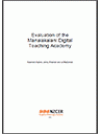This report outlines findings from an evaluation of the first year of a pilot initiative called the Manaiakalani Digital Teaching Academy (hereafter MDTA). The Manaiakalani Education Trust and the schools within its network are described in Section 2 to provide a context for the initiative and the evaluation.
The MDTA pilot was conceived as a proactive response to a growing frustration from many school leaders in the Manaiakalani schools cluster. These schools have been working hard to transform their practice for the digital era. From their perspective, initial teacher education (ITE) programmes have not kept up with 21st century changes in education.
During 2014, 10 newly qualified beginning teachers (BTs) were each paired with a mentor teacher, working alongside each other in the same learning space. The aim was to support these first-year teachers to begin their teaching career working with the digital pedagogies their mentors already skilfully use, thus accelerating their progress to becoming the sorts of highly effective teachers needed by the schools in the cluster. In 2015—their second year of full-time teaching—the 10 BTs now have responsibility for their own group of students but continue to work in the same school, with ongoing close support as needed.
A practical component was embedded within the programme by releasing the BTs on Wednesdays to enhance and extend their digital skills. In 2014 BTs and their mentors also attended The University of Auckland to take part in an academic programme of postgraduate study specifically designed to support the initiative. Most mentors are working towards an MEd qualification and BTs towards an Honours qualification in education. In 2015 most members of both groups are carrying out research projects initially devised as part of their 2014 learning.

